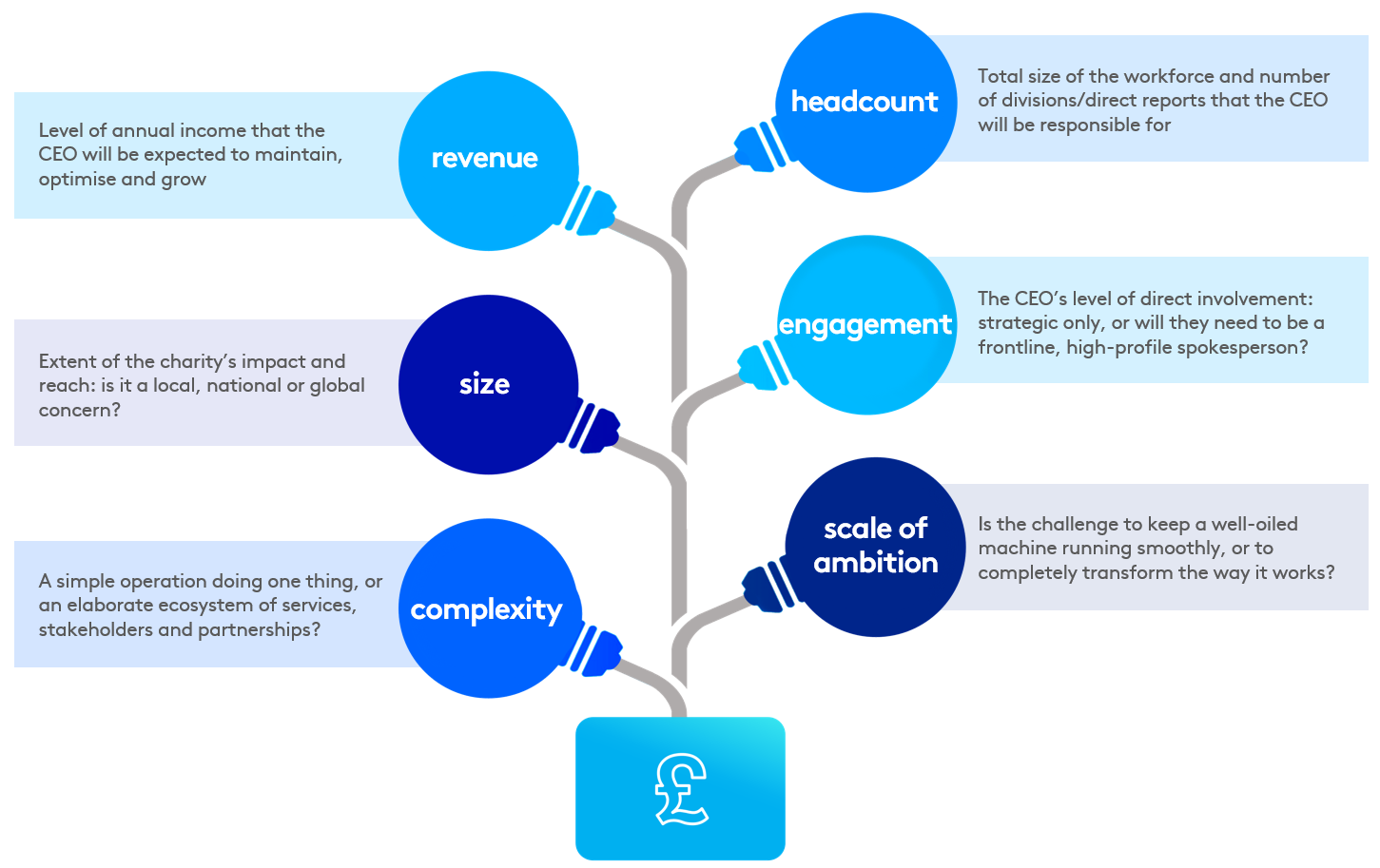2025 Salary Survey: Charity CEO salaries and executive trends


How much do charity CEOs get paid?
The short answer is that although charity leaders tend to earn considerably less than their commercial counterparts, pay still varies enormously, depending on factors like the size and complexity of the charity's operations, its annual income, and the scale of the challenge facing the incoming CEO.
Every organisation is unique, with its own particular priorities and requirements, making every CEO position an individual case, with a salary that reflects the particular context and circumstances of the role.
You'll find more detail on this below, but as such, simply quoting averages would tell you next to nothing about the appropriate pay for any specific role.
The people who can tell you that, however, are our hugely experienced Executive Search team, each of whom has specialised in recruiting charity CEOs, chairs, trustees and other board-level bods (very successfully, we might add) for well over a decade with us alone.
If you need any help or advice on a move or appointment at this level, don't hesitate to give them a call, but meanwhile here's what they had to say about the shape of the current market, in our 2025 Salary Survey.
Executive recruitment trends in the charity sector
For all we hear of soaring CEO pay in the business world, here in the charity sector it remains reassuringly tethered to the ground, with the pay differential between the average CEO and the average worker running at no more than 4:1.
That compares with an average among FTSE100 companies of more than 150:1, somewhere beyond ‘disproportionate and excessive’, in the region of ‘openly mocking your own workforce’.
Charities’ obligation to publish the salaries of their top earners may have something to do with this, but in choosing not to pursue the far greater rewards available elsewhere, charity chiefs show that claims of being ‘only in it for the money’ are a long way wide of the mark.
There’s certainly been little change in the last year, with CEO salaries for all but the very biggest household-name charities peaking at around £120k, although this remains relatively rare in itself.
If there’s been any movement, it’s at the bottom of the bracket where you’re now unlikely to succeed in hiring a CEO for less than £60k.
What are charity CEOs looking for?
Salaries do have a clear impact on the level of interest in CEO vacancies, with those paying six figures attracting up to three times as many applications as those at the lower end.
Yet it’s not the factor with the greatest influence in that respect. That would be the location, with remote-based roles pulling in up to five times more applications than a typical site-based position. To some extent, that’s because they’re relatively rare, given the challenge of leading effectively without at least some in-person presence.
Whether organisations are based in or outside London also has an impact on pay, but beyond that there’s little difference between UK regions.
At this level, leadership salaries for most organisations – hospices being a good example – need to be nationally competitive. However it’s increasingly rare for a CEO to relocate purely for the position: those who do so normally have unrelated personal reasons for making the move.

What else attracts senior executive candidates?
Flexible working of some kind is essential, while other benefits such as pension schemes make a real difference too, and can dramatically improve the appeal of roles with salaries at the lower end.
When there’s no room to raise the salary, some organisations are looking at sweetening the deal by making the CEO a part-time post, but it’s not necessarily the candidate magnet they might have hoped. Applicants question whether the role can ever truly be part-time, expecting (perhaps rightly) that they would soon find themselves working full-time anyway to get everything done, but on a part-time salary.
Generally speaking, however, we’re finding charity boards increasingly clued-up about the market and what they can realistically expect, which makes for a smoother and more effective search.
What can hamper the recruitment process is a lack of alignment between trustees on key priorities, such as whether they’re looking for 2-3 years of strong leadership or someone to steer the ship for the next decade and beyond. Is leadership experience more or less important than a record of getting results?
Unanimity on questions like these goes a long way to finding the right individual at the first time of asking.
Harris Hill Executive Search

What determines the salary level for a charity CEO?
While they might share a title, the job of leading a local 20-person charity is clearly something very different from running a global organisation of thousands, delivering multiple initiatives around the world.
Salaries span an equally wide range as a result, each reflecting the scope and scale of the role in question, but these are the six key factors likely to have the biggest influence on the final figure.

If you'd like to know more about salaries or the market, or for help and advice with any current or future requirements at this level, please contact our Executive Search team via the details below, call 020 7820 7300, or email executive@harrishill.co.uk
Jenny Hills Director
020 7820 7321
Email Jenny
Nick Shanks Director
07766 538575
Aled Morris CEO
020 7820 7301









